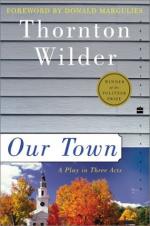|
This section contains 5,064 words (approx. 17 pages at 300 words per page) |

|
SOURCE: Cardullo, Bert. “Whose Town Is It, Anyway? A Reconsideration of Thornton Wilder's Our Town.” CLA Journal 42, no. 1 (September 1998): 71-86.
In the following essay, Cardullo asserts that, despite its outward display of experimental theatrical technique, Our Town fails to question or challenge traditional values regarding family, nation, and religion.
It has long seemed to me that Thornton Wilder's Our Town (1938) has two flaws at its center that have never been adequately addressed by critics, if addressed at all. The first has to do with the play's implicit argument that the cause of man's unhappiness is not his failure to achieve or sustain greatness or wealth, but rather his failure “to find a value above all price for the smallest events in our daily life,” his inability to delight in the beauty of ordinary, “undramatic” existence. The quoted words are Wilder's own, from the preface to his Three Plays...
|
This section contains 5,064 words (approx. 17 pages at 300 words per page) |

|


